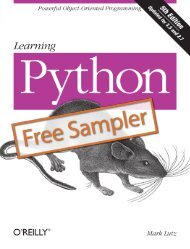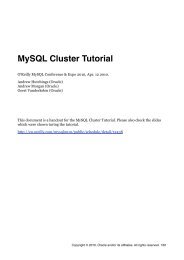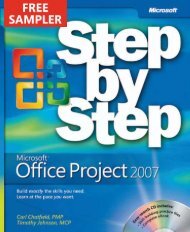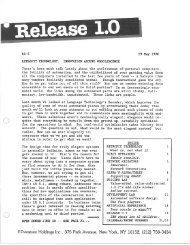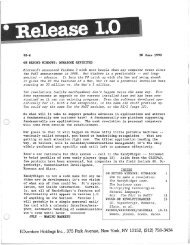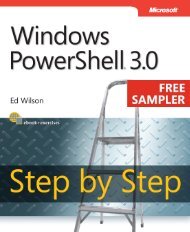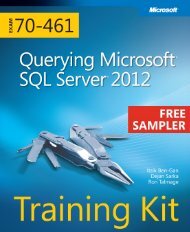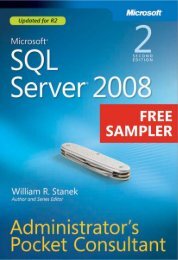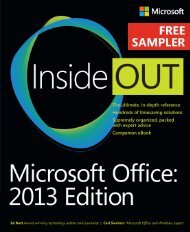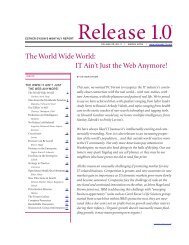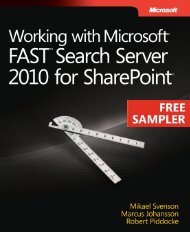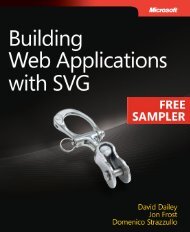Ziff-Davis Publishing Company, One Park Avenue, New York, NY ...
Ziff-Davis Publishing Company, One Park Avenue, New York, NY ...
Ziff-Davis Publishing Company, One Park Avenue, New York, NY ...
Create successful ePaper yourself
Turn your PDF publications into a flip-book with our unique Google optimized e-Paper software.
COMBING SPAGHETTI WITH RECODER<br />
<strong>New</strong> software is exciting to technologists, programmers, and journalists.<br />
But to a true salesperson, an installed-base market is far more exciting, by<br />
virtue of sheer size. Consider the 50 billion lines of COBOL, tended by<br />
millions of software engineers, that run much of this country. Some people,<br />
of course, think they're strangling the country. Most code is reasonably<br />
straightforward when it's first written, but as it picks up patches and<br />
paper clips over the years it deteriorates into a frightening mess.<br />
<strong>One</strong> of the companies dealing with this problem, Language Technology Inc. of<br />
Salem, MA, takes ,the problem down to its essentials. Its Recoder parses a<br />
COBOL program, graphs it to determine its structure, and recodes it into<br />
structured COBOL. While Recoder doesn't "understand" the program, it does<br />
"understand" its structure, and produces a new program that's guaranteed to<br />
do what the old one did, bugs and all.<br />
There are numerous beneficial effects. First of all, the resulting code is<br />
far easier to maintain. Think of structured code as something like text in<br />
an outline processor (or auditing functions in a spreadsheet): You can<br />
determine the dominance and "reach" of any given statement or set of statements.<br />
That is: If I change this little thing here, where will it have an<br />
impact aside-from where I intend it to? This is perhaps the most important<br />
question that can , ever be asked in maintenance, but with unstructured code,<br />
you can't tell.<br />
The mean time to failure after a major patch of an aging COBOL program,<br />
LTI's president Bill Engel tells us, is normally 90 minutes. With "Recoded"<br />
COBOL, it's a matter of days. The programmer can find the piece he wants to<br />
fix, and then be sure that he is "fixing" only what he intends to.<br />
Structured code is also easier to understand, document, and find bugs in.<br />
Although Recoder won't take bugs out (it delivers back to you exactly what<br />
you gave it, albeit in structured form), it will point them out or make them<br />
easier to spot. Additionally, structure makes it easier to figure if the<br />
system is doing what you want it to, or what you think it's doing. That goto<br />
that goes nowhere, or those three little lines that alter the<br />
programmer's salary, will reveal themselves incontrovertibly.<br />
In fact, the idea makes so much sense that IBM in January launched a similar<br />
product, COBOL Structuring Facility. . However, at this point it's unlikely<br />
IBM's product will do much more than legitimize the market, as it works only<br />
with IBM's new VS COBOL II, or a minuscule though growing portion of the<br />
installed base. Moreover, COBOL/SF is not fully automated; it works best<br />
with substantial pre-processing (like a pre-wash cycle?).<br />
Energetic Engel<br />
Recently arrived from Xerox Computing Services, where he was marketing and<br />
sales vp, Engel has taken an interesting idea and put it on a commercial<br />
footing. The company, founded by Harvard philosophy graduate Eric Bush, 34,<br />
had been selling Recoder since early last year as a service, "Ten to 50<br />
cents a line to wash your COBOL." For a typical insurance company, with 5<br />
million lines of code, that worked out to half a million. (Nice work if you<br />
can get it.) Besides, who wants to hand over code to an outside service?<br />
Response was lukewarm at best.<br />
Release 1.0 21 April 1986<br />
12



